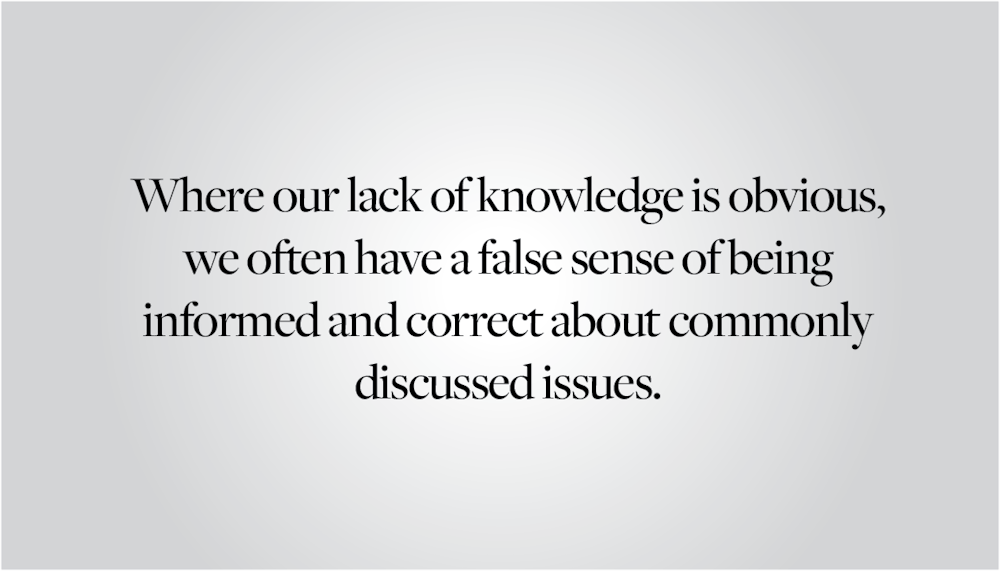What do you think about the ongoing civil war in Cameroon that has displaced millions of people? Do you side with the Francophones or the Anglophones? Most likely, you cannot locate Cameroon on a map (neither could I, before writing this), let alone hold opinions on its civil war. It would thus be silly for you to be expected to express a public stance on this issue or argue about its root causes.
Yet we engage in this exercise almost daily, expressing opinions and debating issues that we ultimately know little about. However, unlike being pressed to discuss the civil war in Cameroon, where our lack of knowledge is obvious, we often have a false sense of being informed and correct about commonly discussed issues.
For example, most Americans have passionate, deeply-held beliefs about abortion. But at the same time, surveys show that most know surprisingly little: 70% incorrectly believe that at 20 weeks of pregnancy, a fetus has a high chance of living outside the womb. 61% falsely assume that the majority of women who get abortions are teenagers, whereas just nine percent actually are. Perhaps even more strikingly, opinions on abortion can change significantly depending on whether it’s discussed in the context of a “baby” or a “fetus.” This is all without exposure to any new knowledge. Of course, not all Americans are misinformed about abortion, and many have nuanced, thoughtful stances. Still, the point stands that a remarkable amount of people who feel strongly about the issue may not fully understand it.
This false sense of knowledge extends to issues that are ultimately more a matter of facts than opinions. For instance, a significant percentage of Americans think they are deeply knowledgeable about how the COVID-19 vaccine works and, as a result, hold strong opinions about it. Yet it is unlikely that a meaningful number of Americans have any real knowledge about vaccine mechanisms. Only six percent of college graduates major in biology and less than one percent of Americans are doctors. Though few Americans have scientific vaccine knowledge, many confidently express false, sensational beliefs about their supposed effects (e.g., “they contain microchips'') and distrust experts who have studied vaccines for their entire careers. The average person with the COVID-19 vaccine is not necessarily smarter or more educated than those who oppose it — rather, they recognize that they should defer to medical experts with demonstrated knowledge.
As humans, we feel strongly that we understand our daily environments. However, our understanding of everyday issues is tenuous at best. Try this exercise: grab a piece of paper and attempt to explain or sketch how a bicycle works. You have probably cycled dozens of times and seen hundreds of people riding their bikes. In theory, bikes are not that complicated — they are composed of just two wheels, some chains, a metal skeleton and handlebars. Still, as studies have shown, surprisingly few people can adequately explain bike mechanics or draw a remotely accurate bicycle. Even the act of turning a bike is a bit different than most people think: when a cyclist wants to turn right, they actually first turn to the left. Bicycles are not a uniquely vexing topic — people also struggle to explain other common objects that they think they understand, including pens, toilets and zippers.
This overall lack of knowledge does not mean that people are willfully ignorant or careless. It is simply a product of the fact that, in our daily lives, it is not imperative for us to know how pens work or the intricacies of vaccines. As long as there are experts who understand these things, we are free to think about the subjects in which we personally excel. In fact, what makes humans special is our ability to rely on the knowledge of our cultures and communities. We become ignorant and careless when we do not recognize this fact and overestimate our individual knowledge.
Just as it would be unreasonable to expect us to discuss the Cameroonian civil war without being able to locate the country on a map, we similarly shouldn't feel obliged to feign expertise on highly contested topics — and we certainly shouldn’t be expected to pick a side. Most issues are complicated and nuanced, and it is impossible to truly understand all of them. Ideally, we would all have to pass a test of our basic knowledge on an issue before espousing views about it, but this is impossible in practice. Nevertheless, if we genuinely hold strong opinions, we should do our best to double-check that our understanding at least surpasses our ability to explain simple objects like a pen or a bike.
Benjamin Aizenberg ’26 can be reached at benjamin_aizenberg@brown.edu. Please send responses to this opinion to letters@browndailyherald.com and other op-eds to opinions@browndailyherald.com.





